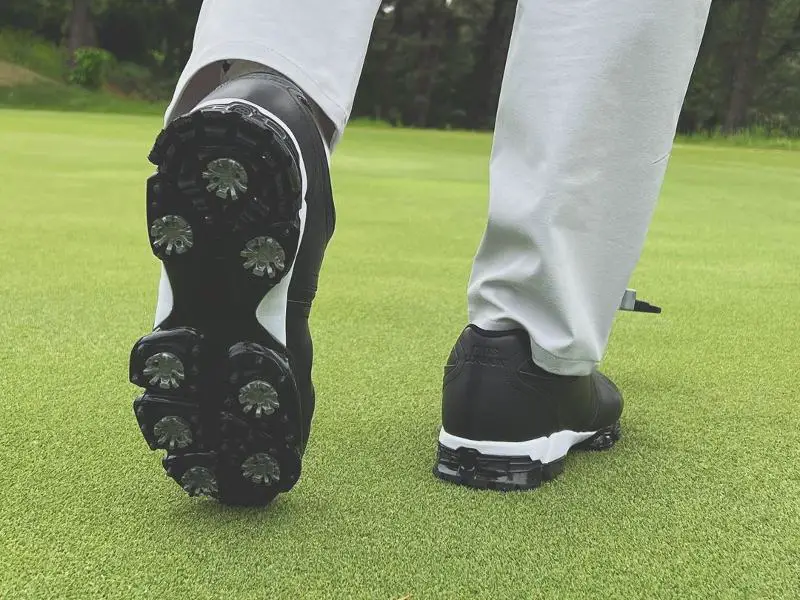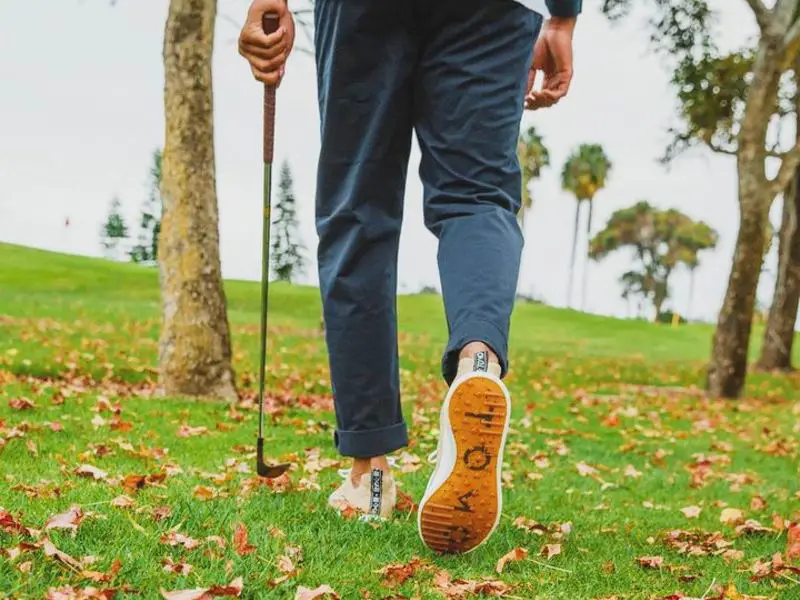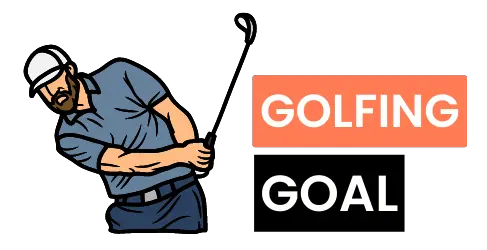
Confused about choosing between spiked and spikeless golf shoes? This decision is crucial for optimizing your performance on the course.
In this guide, we’ll explore the benefits of each shoe type, delve into how they match different playing styles and conditions, and share insights from golf experts to help you make the best choice for your game.
Get ready to step up your golf shoe game with confidence.
What is the Difference Between Spiked and Spikeless Golf Shoes?
1. Traction & Stability
Spiked
These shoes have cleats on the bottom, enhancing grip and stability, particularly in wet or uneven terrain. They are designed to anchor firmly into the ground during a swing.
Spikeless
While these have evolved to offer more traction than earlier versions, they generally provide less grip than spiked shoes.
The outsole features rubber studs or dimples instead of traditional spikes.
2. Comfort & Versatility
Spiked
They tend to be less flexible and more focused on performance on the golf course. The design prioritizes stability over comfort during rounds.
Spikeless
These are more comfortable for extended wear and versatile enough for use off the golf course. Their design often resembles that of standard sneakers, making them suitable for casual use.
If you’re considering wearing golf shoes beyond the greens, you might find insights in Can You Wear Golf Shoes Casually? quite enlightening.
3. Durability
Spiked
The presence of hard rubber or plastic spikes generally makes these shoes more durable under tough playing conditions.
Spikeless
They can wear out quicker than spiked shoes, especially if worn regularly on hard surfaces or off the course.
4. Aesthetic & Formality
Spiked
Often crafted with a classic golf shoe look, they are usually worn in more formal settings or serious play.

Spikeless
These shoes tend to have a casual appearance, making them popular for both casual games and everyday wear.
Pros and Cons of Wearing Spiked Golf Shoes
Pros
1. Improved Traction
Spiked shoes offer excellent grip and stability, especially on wet or uneven terrain, due to their cleats that dig into the ground.
2. Better Performance in Diverse Conditions
They perform well in adverse weather conditions, helping maintain balance and power during swings.
3. Durability
The construction and materials used in spiked shoes tend to be robust, making them last longer, especially under rigorous playing conditions.
Cons
1. Comfort
Spiked shoes can be less comfortable than spikeless options, as they are generally stiffer and heavier.
2. Damage to Greens
The spikes can damage the delicate surfaces of greens, which is why many clubs prefer or mandate spikeless shoes.
3. Limited Versatility
While excellent on the course, spiked shoes are not suitable for wear off the course due to the potential damage they can cause to floors and other surfaces.
Pros and Cons of Wearing Spikeless Golf Shoes

Pros
1. Comfort and Flexibility
Spikeless shoes are generally more comfortable and flexible than spiked ones, resembling the feel of regular sneakers. They’re ideal for walking long distances on the course.
2. Versatility
They can be worn on and off the golf course without damaging floors or other surfaces, making them a practical choice for casual wear.
3. Style Variety
Spikeless shoes come in a wide range of styles and colors, offering more aesthetic choices to match personal tastes.
Cons
1. Less Traction
While improvements have been made, spikeless shoes typically offer less grip compared to spiked shoes, especially in wet conditions.
2. Durability on the Course
The soles of spikeless shoes can wear out faster than those of spiked shoes if frequently used on rough terrains.
3. Performance in Extreme Conditions
In very wet or muddy conditions, the traction provided by spikeless shoes might not be sufficient for stable swings.
Professional Advice on Choosing Between Spiked and Spikeless Golf Shoes

When deciding between spiked and spikeless golf shoes, professionals often highlight several key considerations:
1. Play Conditions
Spiked shoes are recommended for challenging terrains and wet conditions where extra grip and stability are necessary. Professionals stress the importance of maintaining posture during the swing.
2. Comfort and Versatility
For everyday play and dry conditions, spikeless shoes are praised for their comfort. They are easier to wear off the course, making them a versatile choice.
3. Personal Preference and Performance
Many pros suggest testing both types in different conditions. The choice often comes down to personal comfort and how the shoes perform during your typical round of golf.
Experts like PGA tour professionals often use both types depending on the course and weather conditions, highlighting the importance of choosing the right shoe for the right situation.
To fully grasp why selecting the proper footwear is crucial, consider the insights from Are Golf Shoes Necessary?.
Wrapping Up!
Deciding between spiked and spikeless golf shoes isn’t just about fashion; it’s about choosing the right tool for your game based on the course conditions and your personal comfort.
While spiked shoes offer unmatched stability and grip in diverse and challenging conditions, spikeless shoes provide greater comfort and versatility for everyday wear.
Ultimately, the best choice depends on your specific needs and where you play most often.

Meet Edward Green, the founder of GolfingGoal and a seasoned expert in golf. With years of experience on the course and a passion for the sport, Edward has a wealth of knowledge to share. As our Lead Writer, he contributes articles, tutorials, and resources to help readers to improve their skills and reach their full potential on the golf course. Join Our Team!
